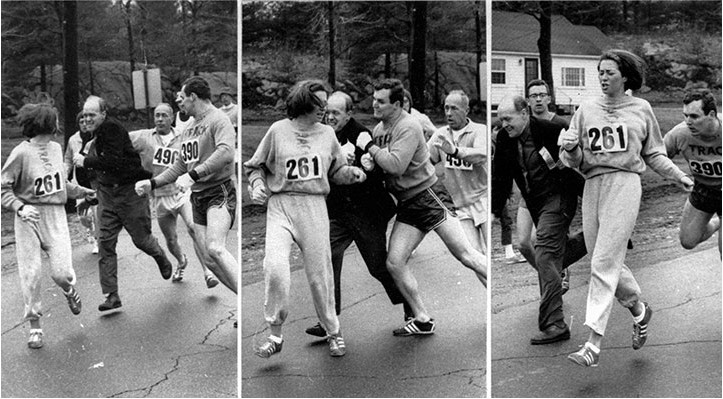How This Woman Changed the Sports World 50 Years Ago
By:
On Monday, runners from across the world competed in the 121st running of the Boston Marathon, one of the largest and most venerated road races in the world. This year more than 13,000 women pounded the pavement -- including 70-year-old Kathrine Switzer, who was the first woman to officially cross the finish line 50 years ago.
However, her appearance today generated much less controversy than when she donned bib number 261 back in 1967, when she was a 20-year-old journalism student at Syracuse University.
Switzer told ESPN that at the time, she had been determined to prove to a male coach that she could complete the 26.2 mile course. After completing a grueling winter training season, she registered for the race as "KV Switzer" -- her first and middle initials. She recalled looking through the race handbook and noting that she couldn't find any rules explicitly barring women from officially entering, even though no woman had ever done it before —with the exception of Bobbi Gibb, who snuck into the race in 1966.
But when news that a woman had registered with an official bib number reached then-race director John Semple, he and another marathon organizer chased after her near the two-mile marker, and tried to rip the bib off her sweatshirt.
 Boston Herald/AP - kathrineswitzer.com
Boston Herald/AP - kathrineswitzer.com
She eventually went on to finish the race in 4 hours and 20 minutes. But the Boston Marathon would not officially allow women to compete in the event until 1972, the same year that Title IX, which requires schools that receive federal funding to open all their activities to both genders, became federal law.
Still, it would take another twelve years after the landmark ruling before women could run the marathon at the Olympic level, when American Joan Benoit won gold in the inaugural women's marathon in the 1984 Olympics.
After her historic first run, Switzer went on to win the New York City Marathon in 1974, and finished the Boston Marathon eight more times, notching a second-place finish in 1975. Monday's race marks her 40th marathon overall, and she recently told the Boston Globe that she doesn't plan to stop anytime soon.
To solidify her place in the marathon's history, the Boston Athletic Association, which organizes the event, said it will retire bib number 261 in her honor this year. Organizers have only taken one other bib -- number 61 -- out of circulation previously, to honor John Kelley, who ran the Boston Marathon 61 times before his death in 2004.
